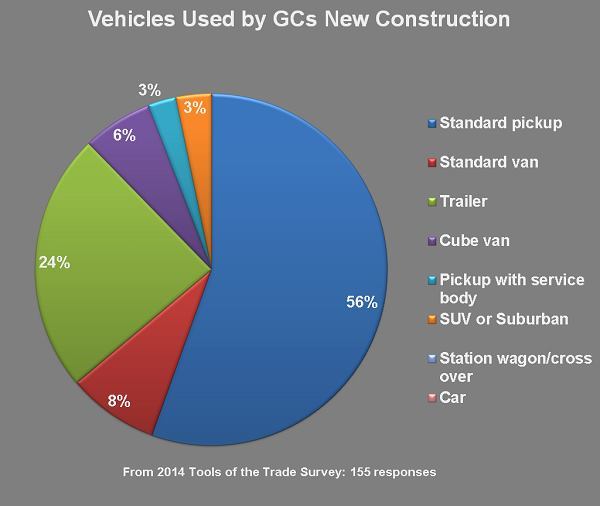Introduction
For contractors, the right work vehicle is an important part of the job. Whether you’re hauling the everyday tools you need to a job site or transporting heavy machinery, you need to be able to rely on your truck. So, which truck (or vehicle) is best for a contractor? Let’s compare ½ ton vs ¾ ton trucks first. Next, we’ll review which types of vehicles contractors and other similar professionals prefer most.
½ Ton vs ¾ Ton Pickup Trucks
A “½ ton” refers to the maximum amount of payload a truck is able to haul. To further explain, if a ton is 2,000 pounds then it would be expected that a 1/2 ton truck should be able to safely transport 1,000 pounds of cargo weight (and a 3/4 ton would transport 1,500 pounds). It is important to remember however; these standards were set in the 1960’s and truck manufacturers have made vast improvements allowing for more weight carried-although the references to the trucks have remained the same.
There are several pros and cons to both the ½ ton and ¾ pickup truck. To determine which truck is best for you, consider how you will be using it most. Do you primarily haul heavy cargo? Or do you put a lot of highway miles on instead? How often do you tow, and what types of machinery are you towing? Below are some general things to consider when deciding which type of truck best fits your needs:
1/2 Ton Pros
- Lower initial cost
- More comfortable ride
- Better fuel mileage
- Less expensive to maintain
1/2 Ton Cons
- Less towing capacity
- Smaller payload capacity
- More light-duty parts to replace
3/4 Ton Pros
- Heavy duty design
- Higher payload capacity
- More towing capacity
- More factory options
3/4 Ton Cons
- Higher initial cost
- More expensive maintenance
- Lower fuel mileage
Which Types of Vehicles Do Contractors Prefer?
According to a 2014 study by “Tools of the Trade”:
- GCs who do new construction prefer pickup trucks over other types of vehicles. They also prefer trucks with sufficient towing capabilities. Standard vans are not popular with this crowd, though they do make some use of cube vans.
- Handymen do some of everything so it should be no surprise that they drive some of everything, though pickups are by far the most popular.
- The finish carpenters who answered our survey are big on pickups, standard vans, and trailers. They make little use of service bodies. I can see why–there’s nowhere to put a miter saw.
- The electricians who took our survey are as likely to drive standard vans as pickups and make surprisingly high use of trailers.
Handyman Startup outlined the following advantages and disadvantages to a pickup truck vs a work van for contractors and handyman, as well.
 Pickup Truck
Pickup Truck
Advantages
- Looks good – Trucks look cool, period.
- You can leave the chemicals in the back and not have to smell them while driving.
- Can park in most home garages.
- Versatility – you can haul just about anything you would need to as a handyman.
- Easy to load lumber.
- Easy to clean.
- Can use as a personal vehicle as well.
Disadvantages
- Tools and supplies are less accessible than a van.
- Whatever is in the back is open to the elements. Ex: if you live somewhere that rains all the time, that could be an issue.
- Limited space for branding.
- Any tools in the bed are susceptible to theft.
 Work Van
Work Van
Advantages
- Tons of Storage.
- Better for organizing supplies and tools.
- Excellent for branding/advertising. Pretty much a driving billboard.
- Easier access to tools.
- Tool Security.
- Keeps everything out of the elements.
Disadvantages
- Can’t park in most home garages. (with ladder on roof)
- Typically get bad gas mileage.
- Limited room for lumber.
- You are in the same air space as whatever chemicals you are carrying.